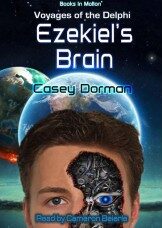The Reign of the Anti-Santas
A Novel by Colin Dodds

I love clever, cynical humor and characters who express it. The wise-cracking private eye, the hapless author or actor who comments on the filthy underside of their business, or even, as in Catch-22, the soldier whose sarcastic observations expose the pointlessness of war. I never imagined I would be reading the sharp-witted, misanthropic account of one of Santa’s elves as he describes the gradual erosion, then downfall of Christmas. I never imagined it, because elves don’t exist, neither does Santa Claus, or North Pole toy factories, or flying reindeer. But, in Colin Dodds’ new novel, The Reign of the Anti-Santas, all of them exist, and they’re nothing like you or I might have imagined.
Although Santa is at the heart of the story, the old man in red remains a mystery. Indestructible, laconic, devious, lascivious, larcenous, it’s not even clear if he’s a good guy or a bad guy, but he’s a necessary guy. Christmas won’t work without him, and it turns out that if Christmas doesn’t work, not much else works either.
Elvin is the cynical, scheming, and often lonely elf who tells the story, and whose adventures are the main focus of the narrative, although much of the time, he seems to be pulled and pushed by events and the whims and actions of others and only comes in to help in the recovery from one Christmas disaster after another. He’s a fixer. What he has to fix is how to keep Christmas going after Santa retires and various corporate conglomerates attempt to keep the season, and all its magical trappings, going as a steady, annual flow of cash.
For the story to work, not only did Santa and his elves have to be real, but also Mrs. Claus, Santa’s kids, the elf toy factory, run by elves who are nearly indestructible, except they can suicidally turn into pine trees if they choose. Reindeer exist to become a staple of the North Pole inhabitants’ diet, but those that fly can, if they’re good enough at it, become one of Santa’s eight-reindeer team on Christmas Eve. Even Rudolph shows up to make his famous run through the fog, but in this story, he then retires to the U.S. to live a life of ease on the royalties from his famous ride and the song that came with it.
The novel’s action doesn’t stay at the North Pole. After Santa’s retirement, Elvin moves to Orange County in California and works at various luxury car dealerships, courts women, and arranges shady deals to try to recruit one or another of Santa’s children to take the old man’s place. As Elvin tells, it, the mixture of the magical North Pole, which soon becomes sought-after real estate for various human marginal characters or corporate functionaries, and a morally bankrupt corporate world manipulating a world of naïve and self-deluding humans, provides a rich backdrop for one after the other schemes to keep Christmas going while milking it for all the cash it’s worth. Eventually, the immorality and downright criminality of the whole line of Santas, beginning with the original and following the line down through each of his sons, sabotages Elvin’s efforts. With the FBI at his door and the fate of the world depending upon him, Elvin has to take the fall for all the nefarious deeds of the many Santas, including the first of the line.
I must say I was delighted and laughing all the way through the book. In the early chapters, I had the feeling that the novel might be like Pete Davidson monologue, smart, funny, but not really headed in any particular direction, but I soon became entranced by the plot and how Elvin was going to pull Christmas out of its downward spiral at the hands of money-grubbing humanity. Elvin gets battered, freezing his toes and losing an eye, but even as he tries to get away from the meat-grinder that the holiday season and its North Pole trappings have become, he is pulled toward it, as its role in holding the fabric of humanly constructed reality, including the experience of time, becomes apparent to him.
Elvin is an elf with a conscience. How he saves things, or at least how things are saved, is an improbable (in truth, impossible) story that reveals insight after insight into the actual world the rest of us occupy and the way we weave stories of magic, heroism, and generosity around events that are most often business advertising schemes, and how easily we are manipulated, and satisfied with platitudes and bromides. In that sense, The Reign of the Anti-Santas is a parable—a labyrinthine and hilarious one—about the society we have created and its dependence upon underlying mythologies whose ultimate purpose is to further the prospects of those who are best at taking what they want. All in all, it’s a tremendously entertaining story.
I was kindly given an advance reading copy of The Reign of the Anti-Santas by the author.
Can an AI be superintelligent, and if so, should we fear it? Read Casey Dorman’s novel, Ezekiel’s Brain on Amazon. Available in paperback and Kindle editions
Rather listen than read? Download the audio version of Ezekiel’s Brain from Audible.
Coming soon! The second novel in the Voyages of the Delphi series: Prime Directive. Release date: November 7, 2023.

Subscribe to Casey Dorman’s Newsletter. Click HERE






